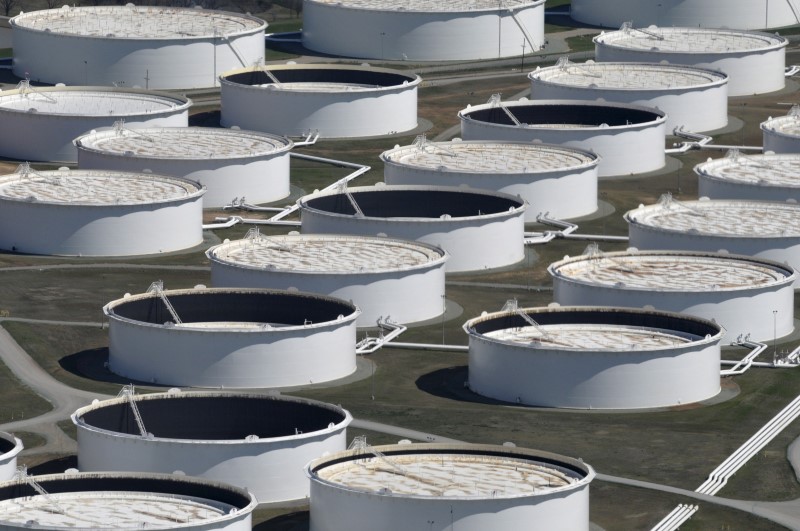By Jarrett Renshaw
NEW YORK (Reuters) - Gasoline and diesel stockpiles have swollen to record highs across the globe, leaving refiners and traders few places to dump excess supplies and threatening large-scale production cuts that could derail an oil price recovery.
Typically, U.S. and European refiners deal with excess regional inventories by exporting extra supplies to markets where margins for diesel, gasoline, or other oil products remains strong. However, months of above-average global refinery utilization rates and the addition of refining capacity globally has left storage tanks from Houston to Singapore full to the brim.
While the crude market has been plagued by world oversupply for two years, a global glut of refined products is a relatively new phenomenon, a result of refiners boosting production last year and early this year to cash in cheap crude supply and hefty margins.
Now the only choice refiners have is to cut production, most analysts and refinery executives say, a process that some refiners in the U.S. and Europe have already started. That in turn, at least in the near-term, will weaken demand for crude oil and serve as a hard ceiling on prices.
Brent crude, the global benchmark, reached a six-month high of $52.51 a barrel in June spurring talk of a sustained oil recovery, but fears that excess global product inventories would sap demand for crude helped push prices back towards $40 earlier this month.
"Unless and until inventories drop, we will not see a sustainable increase in crude prices," Mark Routt, chief economist for the Americas at KBC Advanced Technology in Houston, said on Monday. Routt said he did not expect the market to rebalance until mid-2017.
In a note on Monday, Morgan Stanley (NYSE:MS) analysts noted that the recent dip in oil prices has in fact boosted refining margins, encouraging refiners to produce more and delaying output cuts.
For most of this year, refining margins have been weak, driven down by swelling inventories, pummelling the earnings of independent refiners, such as Valero and Marathon Petroleum along with oil majors like ExxonMobil (NYSE:XOM) and BP (LON:BP).
U.S. gasoline inventories, which hit record highs earlier this year, ended last week at 238 million barrels, 5 percent above the five-year seasonal average, according to the U.S. Energy Department. U.S. inventories of distillates - kerosene, jet fuel, diesel and other products - were 36 percent above the five-year seasonal average at 153 million barrels.
European oil product stocks are also high at the Amsterdam-Rotterdam-Antwerp (ARA) hub. Gasoline in independent storage is up more than 17 percent from a year ago near records at 1.16 million tonnes, according to PJK International. [ARA/]
Distillates stocks in ARA are up 2 percent from last year at 3.27 million tonnes, with some traders storing them on vessels outside European ports. In Germany, the continent’s largest diesel market, consumer inventories in early July stood at a seven-year high for this time of the year.[PROD/DE] (Graphic:http://tmsnrt.rs/2b0P2oR)
While there is no data to gauge the Asia’s fuel inventories, industry sources say they are also high. In Singapore, the region's main crude and refined products trading hub, most onshore inventories run at or near record highs, with floating tanker storage deployed to cope with the supply overhang.
“No one consumes crude, they consume products,” said a Canadian refinery executive. “Until we see those inventories come down, it will be real difficult for crude to have a strong rally again.”
Refiners can react to market conditions more quickly than drillers, so run cuts can more quickly balance out excess product supplies, Goldman Sachs (NYSE:GS) analysts said Tuesday. They expect global refinery maintenance to be above the five-year average in the third quarter but to return to normal levels for the remainder of the year.
Routt said Asian refiners including Japan, South Korea and even oil-thirsty China, keep exporting excess fuels overseas, adding to the glut. China on Monday reported record refined product exports just as its industrial and manufacturing sales took another hit, the latest sign of weak growth in Asia's biggest economy.
He said the biggest victims of the global supply glut will probably be European and Russian refineries, who will be forced to make the deepest production cuts.

“China will not back down, and I don’t think America will either, that leaves Europe and Russia,” Routt said.